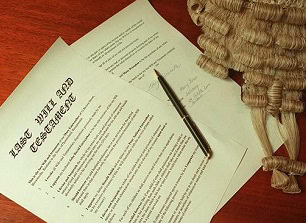The short story: A lady made her own document which looked very much like a Will, leaving the bulk of her estate to her son. She specifically provided that her daughter should not receive anything from her estate and went on to list the reasons for disinheriting her. The lady then died, and two Court hearings (and, no doubt, a lot of legal fees) later the Court held that the document was not a valid Will.[i]
How to determine if there is a will
The longer story: The deceased died in October 2012 and was survived by her adult son and daughter.
It appeared initially that the deceased died without a Will, so the son applied for a grant of Letters of Administration (a grant to be appointed by the Supreme Court to act as administrator of her estate). It was not long after the Court granted Letters of Administration that the son found a five page homemade document which was written and signed by the deceased (“the document”).
The question before the Court was whether the document was the deceased’s Will.
The bulk of the deceased’s estate was comprised of her home. In the document she gave her home to her son.
Arguments used to suggest that the document was the deceased’s Will were that it:
- Included the deceased’s name, address and date of birth at the top of the first page;
- Used language typical of Wills, including ‘being of sound mind’ and ‘bequeath’;
- Outlined reasons why the deceased did not want her daughter or her daughter’s two sons to inherit from her;
- Was placed in an envelope with the words ‘The envelope contains the Will of’ in bold, and which also contained a copy of the deceased’s birth certificate and record of personal and financial circumstances.
Arguments that suggested the document was not the deceased’s Will were that it:
- Was not witnessed;
- Was not dated;
- Contained many corrections and deletions;
- Did not appoint an executor;
- Was torn;
- Was found in the deceased’s beauty case, along with gloves, scarves, costume jewellery, postcards and slides; and not in her metal filing cabinet which contained personal documents including tax and medical documentation;
- Contained the phrase “for the purpose of making the will” (emphasis added);
- Was inconsistent with a previous statement from the deceased that she had left ‘everything’ to her son.
It was clear that the document was not made in accordance with all of the requirements for making a Will as specified in legislation, however, legislation allows such documents to be deemed a Will so long as certain conditions are met.
In this case, the Court could not find that the deceased intended the document to form her last Will. There was not enough evidence to satisfy the Court that the deceased did not want to make further changes to it. The Court said that the law:
“[…]does not merely require that the evidence establish that the document propounded to form the deceased’s last Will purports to state the deceased’s testamentary intentions. What must be established, on the evidence, to the Court’s satisfaction, is that the deceased intended the particular document to form her last Will. On this issue the evidence was far from clear.”[i]
When a person dies without a valid Will, the law dictates who will receive that person’s estate. In this case, the law provided that the deceased’s estate be shared equally between her two children.
The moral of the story: Seek legal advice in preparing a Will. There are strict laws surrounding Wills, and making your own Will can be very risky. Homemade Wills can be very costly to our loved ones and may result in your wishes and directions not being followed.
Turn to Turner Freeman
Turner Freeman Wills & Estate Lawyers are committed to providing professional and practical advice. Call us on 13 43 63.
[i] Lindsay v McGrath [2015] QCA 206.
[ii] Ibid at [66] per Boddice J.
